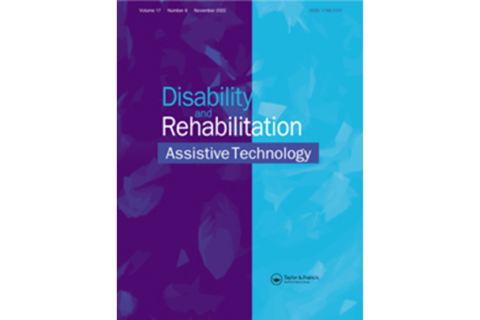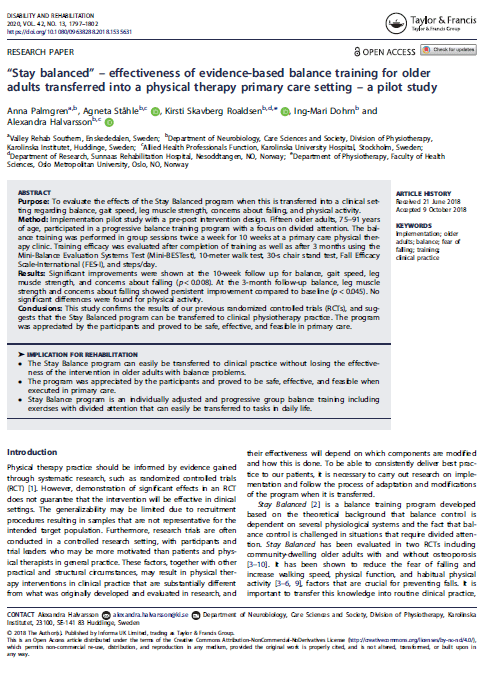Home > News & Research > “Stay balanced” – effectiveness of evidence-based balance training for older adults transferred into a physical therapy primary care setting – a pilot study

“Stay balanced” – effectiveness of evidence-based balance training for older adults transferred into a physical therapy primary care setting – a pilot study
Published on: October 13, 2020
 Palmgren et al (Disability and Rehabilitation 42, 1797–1802 (2020)) enrolled fifteen older adults into the “Stay Balanced” physiotherapy intervention to begin characterizing the program’s clinical utility. The intervention being translated here has undergone previous randomized controlled trials and is designed to progressively challenge participants with multi-task exercises. Over ten weeks, participants’’ balance, gait speed, leg muscle strength, and concerns about falling improved. These results support the efficacy of interventions that recreate the activities of daily living by training patients to simultaneously attend to cognitive and motor stimuli.
Palmgren et al (Disability and Rehabilitation 42, 1797–1802 (2020)) enrolled fifteen older adults into the “Stay Balanced” physiotherapy intervention to begin characterizing the program’s clinical utility. The intervention being translated here has undergone previous randomized controlled trials and is designed to progressively challenge participants with multi-task exercises. Over ten weeks, participants’’ balance, gait speed, leg muscle strength, and concerns about falling improved. These results support the efficacy of interventions that recreate the activities of daily living by training patients to simultaneously attend to cognitive and motor stimuli.
Read Article
Recent Posts
Seasonal incidence of benign paroxysmal positional vertigo
Published on: February 6, 2025
Journal of Otolaryngology – ENT Research | Volume 16 – Issue 1 – 2025 Benign paroxysmal positional vertigo (BPPV) is the most frequent type of peripheral vestibular vertigo.1 BPPV is […]
Read more
When Positional Vertigo is Not “Benign”
Published on:
Hearingreview.com | January/February 2025 Benign paroxysmal positional vertigo (BPPV) is the No. 1 cause of vertigo. Except when it’s actually not the cause. Vertebral artery (VA) compromise can mimic BPPV […]
Read more
Comparison between Epley and Gans Repositioning Maneuvers for Posterior Canal BPPV: A Randomized Controlled Trial
Published on: March 26, 2024
Annals of Indian Academy of Neurology | Volume 26 – Issue 4 – July-August 2023 Benign paroxysmal positional vertigo (BPPV) is one of the commonly occurring causes of vertigo. BPPV […]
Read more
How to evaluate and treat the dizzy patient: non-medical diagnosis-based strategies
Published on: February 16, 2024
ENT & Audiology News | Balance & Vestibular Disorders 2024 It is estimated that dizziness, vertigo and falls are the third most common complaints heard by physicians from all age […]
Read more

 Palmgren et al (Disability and Rehabilitation 42, 1797–1802 (2020)) enrolled fifteen older adults into the “Stay Balanced” physiotherapy intervention to begin characterizing the program’s clinical utility. The intervention being translated here has undergone previous randomized controlled trials and is designed to progressively challenge participants with multi-task exercises. Over ten weeks, participants’’ balance, gait speed, leg muscle strength, and concerns about falling improved. These results support the efficacy of interventions that recreate the activities of daily living by training patients to simultaneously attend to cognitive and motor stimuli.
Palmgren et al (Disability and Rehabilitation 42, 1797–1802 (2020)) enrolled fifteen older adults into the “Stay Balanced” physiotherapy intervention to begin characterizing the program’s clinical utility. The intervention being translated here has undergone previous randomized controlled trials and is designed to progressively challenge participants with multi-task exercises. Over ten weeks, participants’’ balance, gait speed, leg muscle strength, and concerns about falling improved. These results support the efficacy of interventions that recreate the activities of daily living by training patients to simultaneously attend to cognitive and motor stimuli.